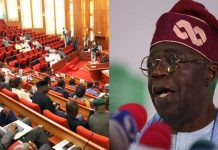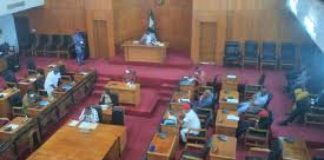🌿 Ruzu Non-Alcoholic Herbal Bitters
Ruzu Non-Alcoholic Herbal Bitters is a natural health supplement specially formulated to:
- ✅ Promote general wellness
- ✅ Detoxify the body
- ✅ Support the treatment of various ailments
Made from a powerful blend of 100% organic and medicinal herbs, Ruzu is completely alcohol-free, making it ideal for:
- 👪 All age groups
- 🌱 Health-conscious individuals
- 🌿 Anyone seeking non-alcoholic herbal remedies
Whether you're looking to boost your vitality, cleanse your system, or support healing the natural way, Ruzu Bitters offers a trusted herbal solution.
President Bola Ahmed Tinubu’s administration has temporarily halted the execution of disputed portions of the Financial Reporting Council (FRC Amendment) Act 2023.
According to reports, this development comes after substantial pushback from business sector stakeholders.
Dr. Jumoke Oduwole, Minister of sector, Trade, and Investment, announced the move in a statement on Monday, citing weeks of high-level meetings with major sector groups.
Sector groups raise red flags.
The Nigeria Employers’ Consultative Association (NECA), the Association of Licensed Telecommunications Operators of Nigeria (ALTON), and the Oil Producers Trade Section (OPTS) have all expressed significant opposition.
Central to the debate is a clause in the revised Act that reclassifies large private enterprises as Public Interest Entities (PIEs), requiring them to pay annual regulatory dues ranging from 0.02 to 0.05 percent of sales, with no ceiling.
In contrast, publicly traded companies are limited to a ₦25 million maximum, regardless of size. Stakeholders noted that such a discrepancy could result in disproportionately high compliance costs, discouraging investors.
Tinubu responds to industry concerns.
Oduwole emphasized that the Act was initially intended to fit with President Bola Tinubu’s pro-business position, which is part of his 8-Point Agenda. However, she stated that the government has heard the concerns and is taking meaningful actions to address them.
“As part of President Bola Ahmed Tinubu’s pro-business stance, this measure aimed to increase financial openness. But we’ve responded with measures based on stakeholder feedback,” she said.
A stakeholder meeting on March 26, 2025 led in an administrative suspension and the formation of a Technical Working Group to address the issues.
Working Group Submits Report.
According to the minister, the Technical Working Group was made up of representatives from NECA, the Manufacturers Association of Nigeria (MAN), the Association of Licensed Telecoms Operators of Nigeria (ALTON), the Nigerian Association of Chambers of Commerce, Industry, Mines, and Agriculture (NACCIMA), the Corporate Affairs Commission (CAC), and the Securities and Exchange Commission (SEC), among others.
Read Also: Ex-int’l football player, 4 others arrested over 22.6kg cocaine, meth seized at MMIA, AIIA
The group met six times in three weeks and issued a detailed report on April 17, 2025.
“Based on the findings, President Tinubu was briefed and recommended the continuation of the pause pending legislative review,” according to Oduwole.
₦ 25m Interim Cap Imposed.
Meanwhile, the Ministry has authorized the Financial Reporting Council to impose an interim maximum of ₦25 million on yearly dues for private PIEs, aligning them with publicly listed firms.
“This move will ensure regulatory equity, boost investor confidence, and allow for a broader review of the Act, with input from the Ministry of Justice where necessary,” according to the minister.
To provide immediate assistance, the Ministry has authorized the Financial Reporting Council to impose an interim maximum of ₦25 million on yearly dues for private sector PIEs, equating them with publicly listed firms.
“This move will ensure regulatory equity, boost investor confidence, and allow for a broader review of the Act, with input from the Ministry of Justice where necessary,” according to Oduwole.
















